North Korean Christian Woman Escapes Sex Trafficking
North Korea
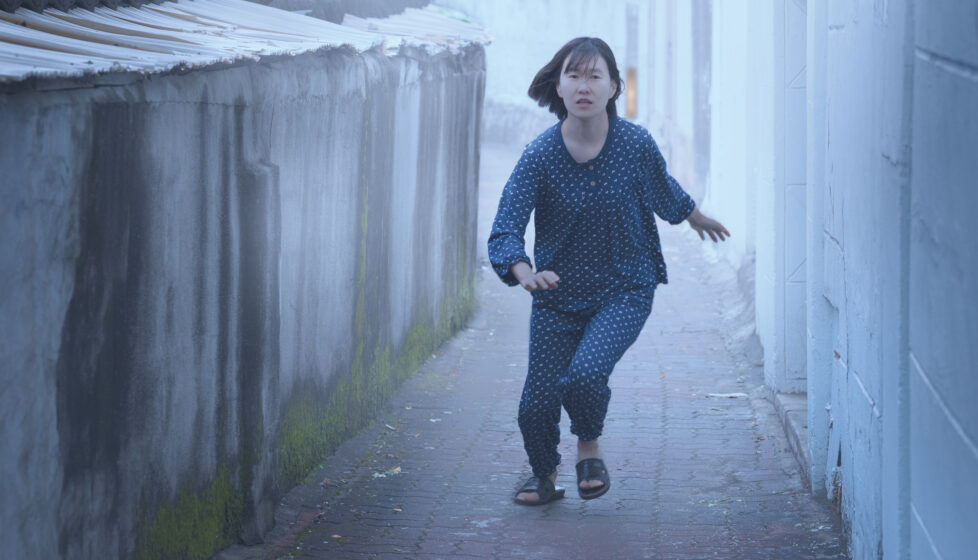
Choon-yei was born into a comfortable and secure family, by North Korean standards. Her father was a military officer, and her mother was a housewife. Since family background largely determines the future for North Korean citizens, her family could expect a good life.
In 1995, however, just a few years after Choon-yei’s birth, North Korea experienced the worst famine in its history. Millions died of starvation. And even though her father was a military officer, Choon-yei’s family received only two fistfuls of corn flour each day — not nearly enough to feed a family of four.
In desperation, they gave up on the government’s ability to provide for them and began dealing on the black market. But the extra corn flour that her mother had obtained from a relative and sold illegally still barely provided for their family.
“Any North Korean who survived that time period is a living miracle,” Choon-yei said. “North Koreans had to break the law just to eat a meal. State security agents would confiscate anything they uncovered on the black market and eat it themselves.”

The famine was just the beginning of Choon-yei’s suffering. Her parents died when she was in her early teens, and soon after their deaths, when Choon-yei was 15, her sister got married. Not wanting to be a financial burden on her sister and brother-in-law, Choon-yei decided to live on her own. Her only option was to earn money illegally.
The North Korean government, intent on confiscating money that people like Choon-yei had earned through the black market, announced a “currency reform” in 2009. Citizens were given one week to exchange all existing currency for the new currency, and anything exceeding a maximum amount set by the government was confiscated. While many who had saved more than the allowable sum lost their money, Choon-yei managed to avoid financial ruin and keep her illegal transactions undetected because she wisely had been trading only in Chinese currency.
A Terrifying Message
In 2012, when Choon-yei turned 20, a friend invited her to come along on a business trip to the Chinese city of Changbai, on the China–North Korea border. Her friend, who visited China often, had told her about people she had met there, including Deacon Jang and Pastor Han Chung-Ryeol.
During their visit to Changbai, the women stayed in Deacon Jang’s home. While there, Choon-yei noticed a picture on the wall of a cross and a man — Jesus — holding a sheep. “The house felt different to me than other places,” she said.
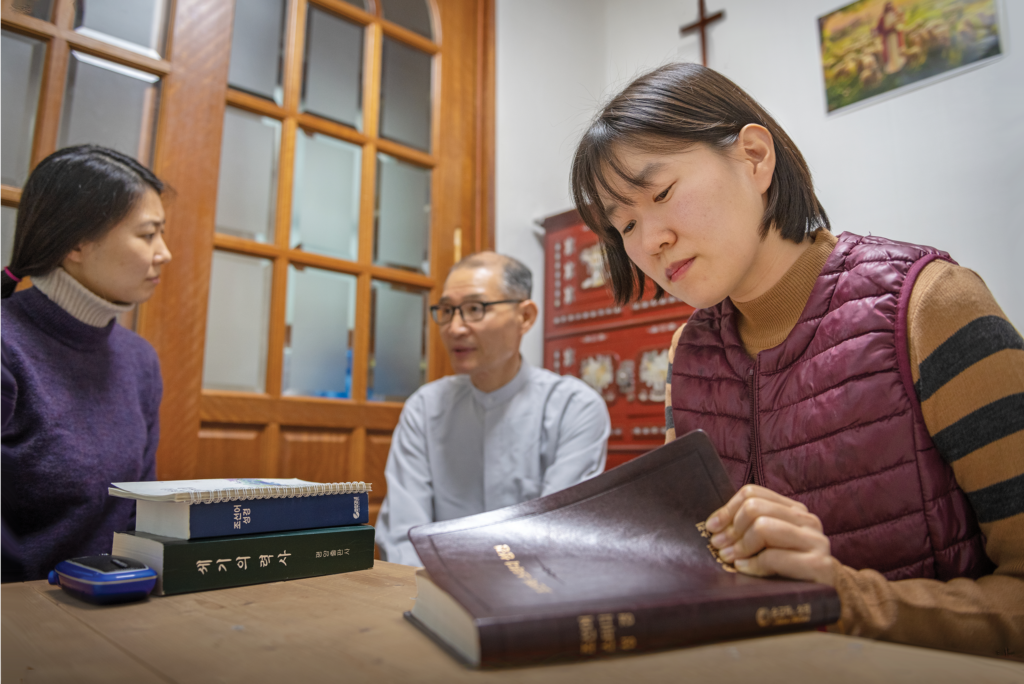
Another curiosity to Choon-yei was the Bible she saw sitting openly on a bedside table; it was the first one she had ever seen. “I just opened it,” she said. “Out of curiosity I did it, but I was really afraid, scared, because anyone who sees a Christian Bible becomes a political criminal. I heard from people that anyone who smuggled or brings a Bible, even if a smuggler didn’t know there was a Bible in a box, they are sent to a concentration camp right away.”
After opening the Bible and touching its forbidden pages, she began scanning the text. “I felt the Bible come into my heart even though it was my first time reading it,” she said. Just hours after she and her friend reached Deacon Jang’s home, Pastor Han arrived and immediately started sharing the gospel with Choon-yei, offering reasons why she should place her trust in Jesus Christ.
“The whole thing made me very nervous, because what we were doing was illegal by North Korean standards,” Choon-yei said. “I avoided looking at him and instead read the Ten Commandments that were printed on the inside cover of the Bible. The crosses in the home terrified me because I knew that being in a place with that symbol could cause me to be sent to a concentration camp when I returned to North Korea.”
After listening to Pastor Han and reading the words in the Bible, however, Choon-yei could not understand why the North Korean government hated Christianity so much. “Christianity seemed to be telling the truth,” she said. “At first I thought Christianity was superstition. But when I saw the Ten Commandments, I realized that if everyone in the world followed them, we would all be very happy and the world would be a much better place.”
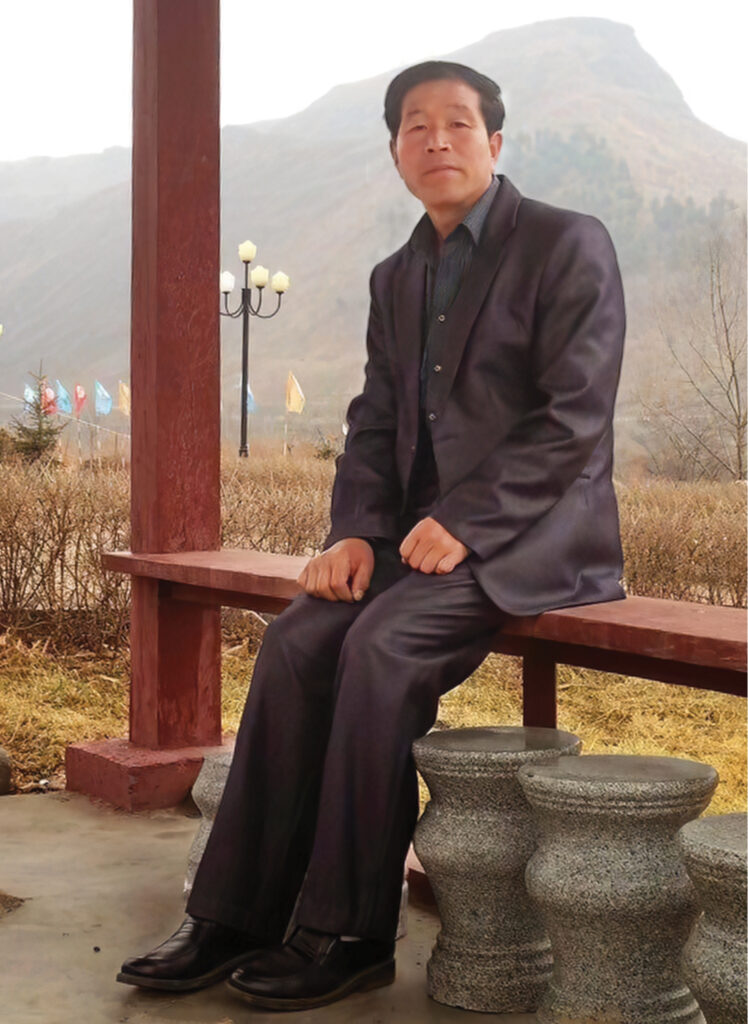
Choon-yei learned more about God by reading the Book of Genesis. “The trees, all nature, I didn’t know that God created all this,” she said. The concept of a Creator God is new to North Koreans, whose understanding of creation is limited to the theory of evolution. In addition, the North Korean view of reality is purely materialistic, so the idea of an unseen God is incomprehensible. Sharing the gospel with North Koreans, therefore, often begins with the Book of Genesis, which sets the groundwork for faith in an unseen but real God.
As Pastor Han began to tell her more about Jesus Christ, her body shook with fear. She knew what it would cost her if the North Korean government found out she had placed her faith in Christ or even heard the gospel.
The following day, Pastor Han returned to Deacon Jang’s house to speak with Choon-yei again. He wanted to tell her as much as possible about Christ before she returned home. “At that time, I felt much better because it was the second time to see him,” she said. After four more hours of teaching, Pastor Han placed his hands on her head and prayed for her. “I felt uncomfortable,” Choon-yei recalled. But when the pastor prayed for her protection crossing the border back into North Korea, she said she felt at peace.
Before Choon-yei and her friend left for their return to North Korea, Pastor Han talked more about Christ and how to find peace. “He told us whenever we have a difficult time, to pray like this and we need to look for God, Jesus,” she said.
The pastor’s teaching never left her. “Pastor Han explained to me that God is Creator and God is listening to our prayers,” she said. “So whenever I had any difficult times, I always began to pray, ‘Lord God, please help me in this and that.’ Without recognizing that I was praying, I naturally came to pray.”
Choon-yei would need to remember Pastor Han’s words in the days to come. As she and her friend began their dangerous return to North Korea, her friend warned her to stay quiet about their visit in China.
Escape in Pajamas
Shortly after Choon-yei returned home, North Korean state security agents rounded up several hundred people associated with Pastor Han and Deacon Jang’s ministry. North Korean spies had traveled to China pretending to be interested in Christianity and acquired the names of North Koreans who had met with the two Christians. The friend who had taken Choon-yei to meet them was among those arrested, and, under the stress of interrogation, she gave authorities Choon-yei’s name.
Choon-yei’s worst fears were realized one morning when state security agents arrived at her sister’s house, where she was staying. Still wearing her pajamas and slippers, Choon-yei sneaked out through the kitchen and ran to a nearby friend’s house, where she borrowed clothes and shoes. She told her friend that she had to leave suddenly because her sister and brother-in-law had gotten into a fight.
Choon-yei’s sister tried to stall the security agents, but eventually they realized she was lying to them and called for reinforcements to help them search for Choon-yei in nearby homes. But Choon-yei was far ahead of them. Using her sister’s ID card, she had boarded a bus heading for a relative’s home two days away, where she would hide until she felt safe.
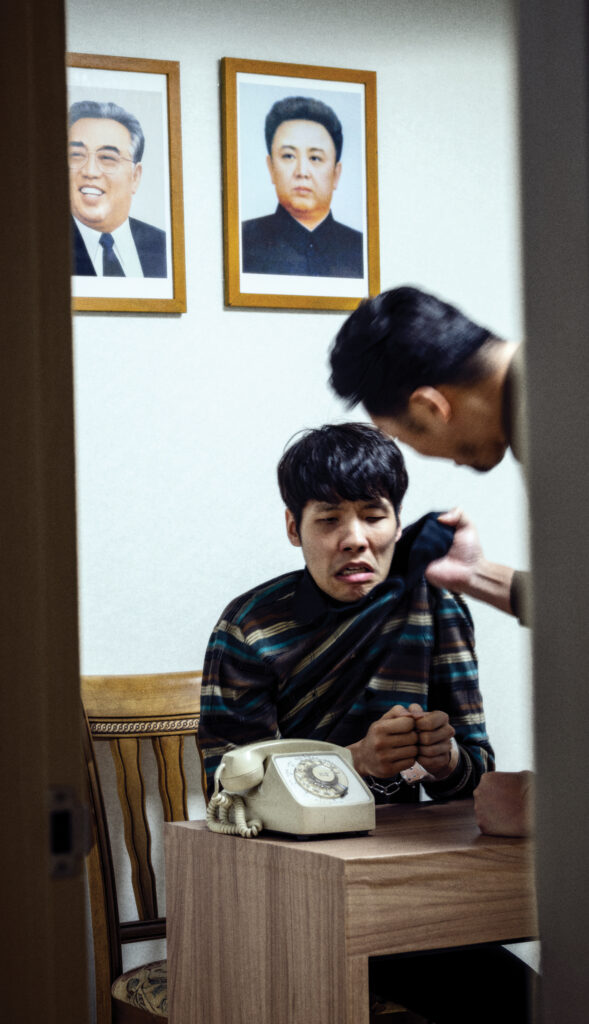
After several months, Choon-yei decided it was safe to return home. The government had not abandoned its pursuit of Pastor Han and Deacon Jang, however. In November 2014, North Korean state security agents abducted Deacon Jang in China and imprisoned him in North Korea. Months after his abduction, state security agents arrived at Choon-yei’s home and told her that Deacon Jang had been arrested. They pressured her to testify against him, claiming that he had discussed overthrowing the North Korean government.
While she admitted to visiting Deacon Jang’s home, Choon-yei told the agents that she hadn’t heard him say anything against the government. “The agent kept assuring me that nothing bad would happen to me if I just gave them the statement they wanted,” she said. “But I refused. I was really afraid at the time, but I think that ever since Pastor Han had prayed for me, God has always taken care of me.”
Sold into sex trafficking in china
Several years later, in 2017, one of Choon-yei’s friends persuaded her to return to China for an opportunity to make money. When she arrived in China, Choon-yei learned that her friend was a sex trafficker who sold North Korean women to Chinese men as wives. Having no knowledge of Chinese and no way to escape back to North Korea, Choon-yei and six other women had no choice but to await their sale to Chinese men.
North Korean women are often targeted by sex traffickers, who deceive them with promises of moneymaking opportunities. Stuck in China, some have been unable to contact their families in North Korea for more than a decade.
Choon-yei was the first woman in her group to be sold to a Chinese man.
Fortunately, Choon-yei’s Chinese husband and family were kind to her, which is rare in sex trafficking. More often, North Korean women are abused by their Chinese husbands and are forced to stay in hiding to avoid detection by Chinese authorities, who routinely return them to North Korea for arrest and prosecution.
Despite her husband’s kindness, Choon-yei was troubled and refused to eat. Eventually, after contacting some relatives who had escaped to South Korea, she managed to escape from her husband and his family. Surprisingly, when they learned of her escape, they wired her money to ensure that she could buy food and arrive safely in South Korea.
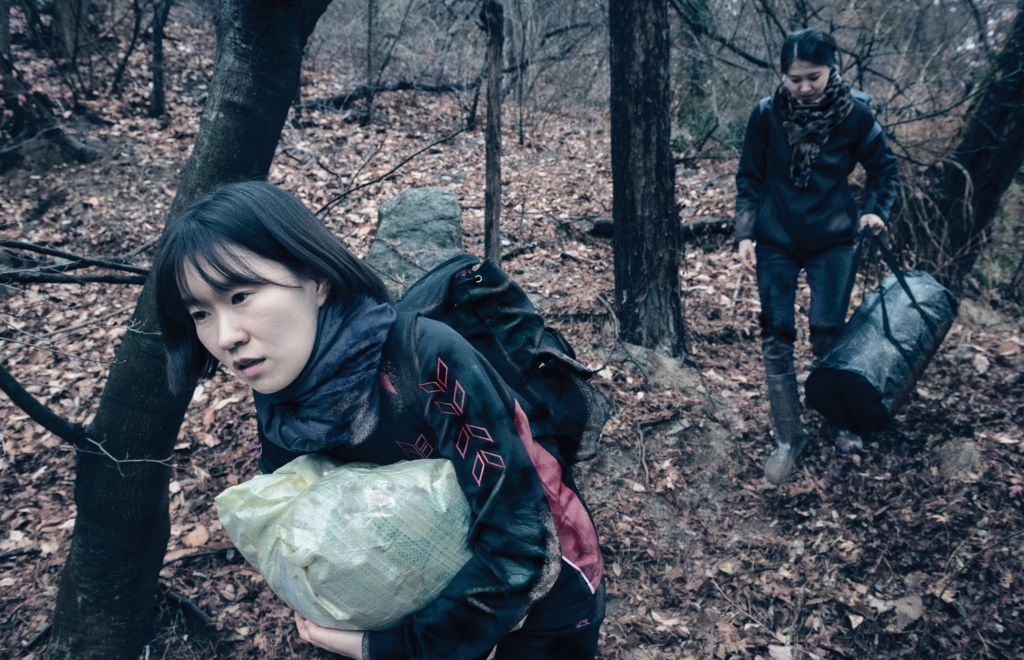
Choon-yei never forgot what Pastor Han had told her. During her escape from China, she prayed to God: “Lord, if You are real, then make my journey safe going to South Korea; then I am going to follow You.”
The Cloud of Witnesses
After her long journey to South Korea, Choon-yei was sent to a resettlement center where North Korean defectors are taught basic life skills to help them function in South Korean society. While at the center, she learned that Pastor Han had been killed.
“My anger toward North Korea increased because North Korea had killed such a good man [who helped] a lot of North Koreans with food and money,” she said. “I felt like I was seeing the real face of my country. He tried to help North Koreans survive. What was his crime?”
While at the resettlement center, she also thought about her Chinese husband. He was a sincere, honest man, and he had taken good care of her despite the fact that he had purchased her. “It was so painful for me to leave him behind,” she said. Eventually he was able to join Choon-yei in South Korea, where he, too, became a Christian. “He goes to church with me and is getting to know God more now,” she said.
Though Choon-yei’s husband does not speak Korean and she is still learning Chinese, they are committed to building a Christian marriage. They attend VOM’s Underground Technology discipleship-training program in Seoul, and a Chinese translator helps Choon-yei’s husband understand the lessons.
As Choon-yei considers the difficulties she has faced in life, she now sees how God has intervened and drawn her to Himself. “I am grateful for everything,” she said. “I will be grateful if God uses my husband and me in any way.” She also prays that her isolated homeland of North Korea will be opened for the gospel. “North Koreans need to know quickly,” she said, “as quickly as possible they need to know the truth. They should know who the Creator is.”
Choon-yei is especially grateful for the way God used Pastor Han and Deacon Jang to reach her with the gospel. She asks Christians around the world to continue praying for Deacon Jang, who has been in prison since November 2014, and for the families of both Deacon Jang and Pastor Han. “The Bible says we are surrounded by a great cloud of witnesses,” she said. “They are part of that cloud. And now is my hour to faithfully run the race for which Deacon Jang and Pastor Han first trained me.”


 Guide
Guide